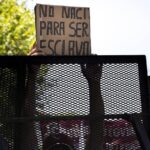
Now it’s college, but before it was almost everything else. There have been strikes in Preschool, Primary and Secondary. And not one or two or three or four: seven. Meal scholarships have been denied and children have been fed pizza for months. The Assembly of the Community of Madrid approved a law for this to defend the charter school and there is another one in the making for the university – the worst funded in Spain – which according to the rectors themselves is not going to improve the “critical” situation they are experiencing in any way.
The cry for help from the rectors in the face of what they define as suffocation due to the underfinancing of the Madrid campuses, the rejection of the Executive of Isabel Díaz Ayuso of 169 million offered by the Government to hire more than 1,000 university professors (later half rectified) and the decision to raise the university budget by 4.2% by 2025 – an amount that those responsible for higher education described as “insufficient” shortly after – They have made up the last installment of a book with many previous chapters.
In the Community of Madrid directed by Díaz Ayuso, Baccalaureate is paid for in private centers for families with incomes exceeding 100,000 euros per year, while the most expensive public prices in Spain are set for the university and all kinds of facilities are provided for the creation of private higher centers. Public land is given to private centers that – against the law – are born with a concert under their arm. The privatization of FP is going from strength to strength at the expense of thousands of applicants without a place in public centers despite being the only region, along with Catalonia, that charges for studying in the state network. A unique success model (0-6 year old schools) has been closed without too many arguments.
The attack on the university that is becoming visible these days is only the last link in a chain that has spread in the Community of Madrid. President Ayuso has accumulated five years of erosion of the public education system. As many as he has been in office.
From the bottom up, without distinction of stages or victims, Ayuso is transversal: in these years he has managed to anger the employers of early childhood education, those of private centers, the directors of public ones, students and teachers. To achieve this, it has managed to get unions such as Anpe or CSIF to call a joint strike with organizations as opposed to them as CGT or CNT.
Last goal: university
Without the rest of the fronts having improved – teachers plan more strikes in Primary and Secondary –, the focus now turns to the university. The six rectors of the public centers had opted for a low profile in the face of cuts in funding in recent years, but the situation is already “critical” – in their words – and they have decided to change their strategy, putting Ayuso’s university policy on the front line.
The rectors lamented in a joint open letter that they receive less real money today than in 2009, because since then the Community has increased its financing by 5%, but the CPI has increased by 35%. Furthermore, Madrid is currently the only region that has not signed (nor declared its intention to do so without conditions) the María Goyri program, by which the Ministry of Universities will co-finance the creation of university teaching positions required by the law.
The protests have had some effect: the regional government announced this Tuesday its intention to finally join the program, although in the public note it sent it explained that it was going to propose an “alternative” to the ministry. Sources from the department headed by Diana Morant announced that they will not accept because they do not want to draft an ad hoc version for Madrid of the agreement that the rest of the Communities have signed.
In the afternoon the president met with the rectors, to whom she also gave some reassurance. The Community reported that financing will increase by 4.2% compared to last year. The Ministry sent a first note in which it spoke of 3.8%, an amount confirmed by sources present at the meeting. But that figure was below the general increase in the educational budget (4%), which was the minimum amount that the rectors had requested (ideally they speak of 200 million euros). With the headlines already published, Education sent a second version: the increase would be 4.2%.
The rectors sent a note shortly after in which they thanked “the effort” of the regional government, but also described the increase as “insufficient” “to guarantee the sustainability of Madrid’s public universities, ensure the quality of our institutions, and correct their chronic underfunding.” after 15 years without a real increase and address the necessary investments in infrastructure.”
In defense of the concerted
One of the axes of Ayuso’s educational policies, as before her predecessors, has been the defense of private charter schools, to the point of creating a specific law so that they can maintain their status. After 20 years – since Madrid received the powers of the sector – without its own autonomous norm, the regional Executive decided that just after the Lomloe was approved it was the perfect time to pass a law dedicated, basically, to counteract the national norm. .
It is equally true that a good part of the Celáa law was created to put a stop to Madrid’s privatization policies and that the Community reacted with the Master Law “in defense of educational freedom.” In this rule, the regional government shielded – successfully – the very Madrid custom of giving up public land at an almost lost fund (75 years and a minimum rent) to build subsidized private schools, which Ayuso has carried out on more than one occasion.
With or without a rule, Ayuso’s policy is summarized in the arguments given in a report to justify the creation of a private, subsidized center in Villalbilla: since the public school is full, the Ministry of Education argues, a subsidized one must be built.
And from the private
One of the milestones of Ayuso’s mandate – due to the noise it made – was the decision, which this newspaper reported, to finance the Baccalaureate in private centers for families with a per capita income of 35,913 euros (that is, with three members, one child , up to 107,739 euros, with four children, 143,652). The community defined these families as “low income” to justify the measure.
The measure was also extended to Vocational Training, which like Baccalaureate is a non-compulsory stage and therefore is not usually financed outside the public system. In this case, furthermore, privatization is added to privatization: private initiative FP is skyrocketing in Madrid, where it has multiplied tenfold in recent years while the public service is deteriorating: finding a place in the state network for certain training courses with a lot of demand are practically impossible. Another consequence of this privatization has been that the private student body has come to fill the places to do the necessary internships to obtain a degree, leaving out those who came from public centers.
With these scholarships (technically they are not) the president managed to ingratiate herself again with the employers of the private school without an agreement, which had also protested the inaction of the Community regarding the payment of mandatory fees in subsidized centers, a practice prohibited by law and that private schools accuse of “unfair competition” on the part of the concerted school.
Make everyone angry in childish
Ayuso has managed, in the five years she has been president, to have both the children’s employers’ association and the teachers go on strike. The owners of the centers took to the streets to protest, in this case, an alleged favoring of public schools through a La Moncloa program financed by Brussels. It is not a sector that is there to boast of public service, in any case, with thousands of families left out every year.
Teachers have also taken to the streets, tired of the eternal precariousness of a profession in which they can take care of two dozen children in exchange for just over a thousand euros a month.
The 2008 cuts, without reversing
In general, the Community of Madrid is the only one that has not completely reversed, in Primary and Secondary, the cuts imposed by Mariano Rajoy’s PP after the 2008 financial crisis. Sixteen years later, teachers have two more teaching hours (weekly class) than the majority of his classmates in the rest of Spain. Months of fruitless negotiations finally crystallized in several days of teachers’ strike that brought the entire union ideological arc into agreement; the last one, a couple of weeks ago.
Source: www.eldiario.es

